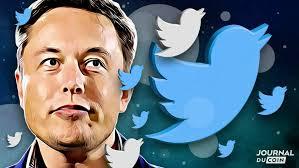
Elon Musk said he was taking over Twitter in the name of free speech. Twitter was faulted for trying to keep a lid on harmful craziness. Notably, its banning Trump (as did Facebook) in the wake of his election lies and incitement to January 6.
This was cast as part of “cancel culture,” America’s political right feeling its freedom of speech imperiled. I’ve favorably reviewed Robert Boyers’s book, The Tyranny of Virtue, under the heading “Woke Gone Wild,” criticizing the censoriousness of today’s hard left.
But while the left censors higher education, the right wants to do it for lower grades — passing laws like Florida’s “Don’t Say Gay” bill barring educating kids about realities of sexuality, a key aspect of life. And “Critical Race Theory” (not even taught in any public schools). They even query why kids need to hear about slavery. Well, maybe because it shaped American history and its reverberations still bedevil us today — as shown by Republicans tying themselves in knots over the issue.
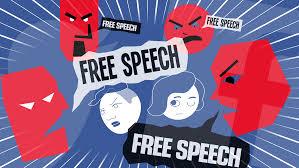
Musk (who seems to be a right-wing nut job himself) has found the whole free speech problem a lot more complicated than he’d imagined. This self-styled free speech warrior soon found himself censoring content and even banning (“cancelling”) people he doesn’t like. Twitter’s supervision of content has now become one big hell of a mess, its rationale a muddle.
Interestingly, as The Economist’s “Lexington” columnist recently put it, “America has no problem with speech. It has a problem with listening.”
He quotes The New York Times, editorializing about a Yale Law School incident where students claimed to be exercising their free speech rights in shouting down a free speech discussion. Because one panelist was a conservative Christian. Americans, said The Times, are losing “the right to speak their minds . . . without fear of being shamed or shunned.” But Lexington comments that The Times itself is in the shaming and shunning business — protected by the First Amendment.
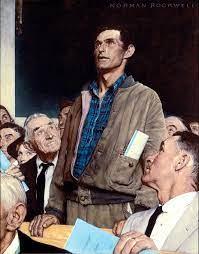
Which, we often forget, bars only government censorship. Anyone else has a right to “shame and shun” those they disagree with. That itself is an exercise of free expression. And you do have a right to express your opinion — but not a right to be free of any other people’s reactions, blowback, shaming and shunning.
Yet it is the shaming and shunning that is often the problem — for those who do it. Because it means they’re confining themselves within self-made prisons of thought, walled off from the free flow of ideas that makes for a vibrant and healthy discourse. Thus has higher education in particular become a total antithesis of what we long imagined it should be, with student minds expanded by their exposure to a wide spectrum of ideas, best enabling them to develop their own. Instead of that we get an intellectually impoverished landscape of enforced received “wisdom,” not to be questioned.
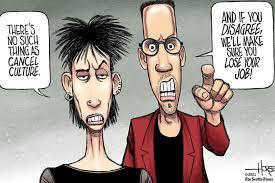
Of course those “cancelled” are harmed too. People have lost jobs. But at the end of the day it’s not really a case of speech being stopped. If you want to say something, there are plenty of opportunities to say it. Like my blog; I’ve encountered “shaming and shunning” but it hasn’t stopped me saying what I please. So, again, Lexington’s point: the real problem is not lack of speech but lack of listening; it’s people closing themselves off from divergent voices; making them intellectually impoverished. And thereby impoverishing our whole culture of ideas.
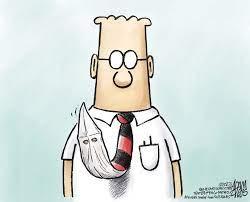
The latest kerfuffle is the idiotic Youtube rant by “Dilbert” cartoonist Scott Adams saying Black people are a hate group whom whites should shun. Equally idiotic is Elon Musk’s agreeing with Adams and defending him on free speech grounds.* Again, “free speech” is not the issue here. Nobody denies Adams’s right to say stupid stuff. Criticizing him is also freedom of speech. And Adams has no right to say stupid stuff with no consequences. No right to have his cartoons continue being bought by newspapers who find them, as well as him, hateful.
There’s now a case before the Supreme Court challenging the legal structures that exempt platforms like Facebook and Twitter from liability for stuff third parties post on them, and also allow them to quash content they deem unacceptable. Without these protections, it was felt, such platforms could not function at all. Now nixing those rules could blow up the internet as we know it, as a venue for public debate.
Also under legal challenge here is the use of algorithms** to display and push content, like Facebook’s mis-named “News Feed.” Barring platforms from thusly prioritizing some content over others could destroy internet search — with googling, rather than presenting the most relevant hits first, showing a mishmash of mostly useless garbage.
These are complex issues and it doesn’t appear that the Supreme Court’s judges are tech-savvy or have a good handle on them. Let’s hope they don’t try to “fix” the internet, with all the unintended consequences that could entail.

* Musk is responsible for some terrific achievements, with Tesla and SpaceX. How can it be that he’s such a jackass?
** BTW, my favorite band is Al Gore and the Algorhythms.
Advertisement